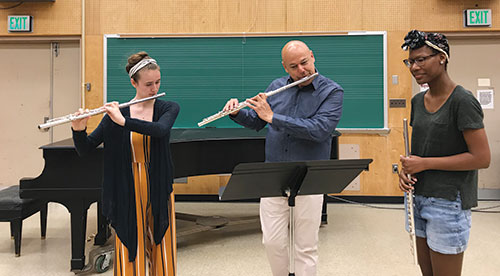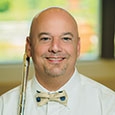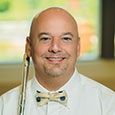The subject of preparing to embark on the arduous process of college auditions for potential music majors is something that can ironically often shut down the process of musical growth for students and teachers alike. A better approach is to reframe the entire conversation by focusing on the development and communication of musical aptitude. This ignores the many ideas and plans already put in place by a great number of mentors who coach the increasing number of students competing for places at conservatories and universities.
Facing Fear
There are not many variances among the different kinds of auditions. People are making decisions that will affect others. People are being judged. There is competition and there is music. There is also a fair amount of fear. At a recent college audition preparation course, someone suggested to high school students that they should not be afraid to audition. That is probably as effective as telling someone they need to love someone they loathe. There are many valid reasons to be afraid going into auditions. Fear of rejection, failure, the unknown, lack of confidence, little understanding of one’s value as a musician, limited awareness of universal standards, physical responses to fear, and the list goes on. Fear is real. Killing one feeling means killing them all in music.
There are good reasons to be fearful. A decision about where you could study for the next four years and how much financial support you receive is happening in that moment, and fear reveals that this means a lot. It signals an urgent moment and it tends to crowd out the cozier feelings.
One has to learn to function on their highest level while experiencing fear. I have found that by embracing this urgent energy, doors to other feelings take over and completely overshadow the fear without killing it. Fear can be a catalyst to build momentum. Fear shows that you respect the people you are playing for in the audition. If you own your fear without obliterating it, you will be in full possession of your audition.
Musicians deal with varying levels of anxiety while playing. However, when listening to others, we just listen to the music and the way they play their instrument. I don’t often ask myself how this person is feeling. Instead I am pondering how they feel about the Prokofiev Sonata, this excerpt, or a particular phrase. A student’s emotional state during a brief audition is not relevant to the music. I even coined a phrase: “Feelings don’t matter in Classical Music” to jokingly say to young musicians. It means that their feelings are less relevant to a performance of a great work than those of the composer who wrote it. If students learn to identify with the feelings in the music itself rather than their own, they have a better chance of rising above personal frailties at auditions. No one expects a performer to feel nothing about an audition, but consider it to be one of a multifaceted complex system that swells and recedes. If musicians cannot function within their own storm they cannot move forward.
Think of one or two words you want the jury to experience as their impression of your work. Some examples might include: unexpected artist, elegant, intelligent expression, compelling, strange beauty, and exciting. Then, project those words into the room through your chosen repertoire.
A number of years ago I was evaluating Brevard Music Center auditions and a gorgeous recording from an applicant came up. After listening to it I exclaimed loudly, “you’re in!” This is what everyone wants to hear at the end of an audition, so imagine this result. Visualizing outcomes is a necessary part of turning dreams into reality.

Playing Preparation
True grit comes from a tenacious spirit and hard work. There are categories in music making and flute playing where certain standards must be met, and that varies greatly from school to school, depending on teachers’ expectations. Below is something of a checklist for students to conduct some self-evaluation. These are some things teachers may have on their minds during auditions.
Rhythm
Can you calibrate time accurately and in all rhythmic measurements? Do you understand the difference between tempo and rhythm? Can you show rhythm through phrasing by communicating a hierarchy of beats, strong and weak?
Articulation
Can you demonstrate a range of strengths in articulation, from gentle and unobtrusive to firm and decisive? Does the articulation come with an extra sound that isn’t flute tone? (It should not.) Is the articulation unnoticeable? Can you double tongue with ease and convincing finger/tongue coordination?
Tone
Does your tone have a signature quality to it that is your own? Is it varied, flexible, and the vehicle for your expression? Can you play forte and piano with equal beauty?
Intonation
Can you hear harmonic context when you play a single note? Are intervals in tune? Does the return of an individual note in a phrase match the pitch of the previous iteration of that note? Can you match the pitch of a piano, drone, or other instrument quickly?
Vibrato
Can you maintain tone and pitch integrity while using vibrato in all dynamics? Can you vary the depth and speed to convey the spirit of your music? Does it come with unwanted throat noises?
Left Hand First Finger
Do you lift it for every middle D and Eb? Every time?
Trill Fingerings
Do your right-hand fingers move left to operate the trill and auxiliary keys? Do you lift LH 2 and 3 for Ab to Bb trills and 3rd octave Eb to F? Do you lift RH 2 and 3 for Eb to F trills? Do you know the correct way to trill C/C#-D/D# in each octave? Look at your trill charts.
Breathing Places
Do you plan each breath for every phrase in every piece?
Musical Goals
Are you clear about how to communicate the length, shape, and structure of basic phrases? Are you a good story teller with your music? What do you want the listener to know or feel when they hear each phrase? Are dynamics planned?
These are only some of the specific ideas experienced teachers might bring to an audition when listening to your work. They are really basic areas that should be addressed by students and their teachers in advance. It is common to have strengths in some areas and need work in others. Many students also do not have the ability to accurately recognize a deficiency in one area since that requires a certain level of mastery to determine. When there is a weakness, it usually stems from a lack of awareness that it even exists. Students may also over-inflate a strength that others would perceive as a weakness. Previous praise may have left them with the idea that they were judged above average at some point in their studies, resulting in stagnation. Constant reevaluation and regular feedback from different sources will help overall progress move ahead.
Repertoire
In order to be fully prepared for college auditions, students should begin several years in advance with level-appropriate repertoire, etudes, and scale exercises. The etudes and scales develop music reading skills and facility on the instrument. Without them, little is possible. I have found that choosing audition repertoire too early can be musically deadening to young players who whittle away at pedantic details at the behest of their teachers. Often with six months to a year to prepare two audition pieces, students are not encouraged to play shorter, easier but no less wonderful pieces for enjoyment or to develop their music reading skills. Sometimes they skip over a level of intermediate-level works, going from basic to college level, with very limited exploration of intermediate works.
Motivated by ambition, a need to keep up, or not wanting to be perceived as an unfinished product, students stop developing their creativity by playing less technically demanding pieces. However, there are sophisticated works in the repertoire that cannot be played convincingly without exploring those short, fun flute pieces. Of course, students need to be familiar with their eventual audition repertoire, but not at the expense of losing all sense of enjoyment and confidence. Nothing destroys confidence like spending a year on a piece you daily have to worry about never being able to completely master. Short projects, given week to week, in addition to the big works will help balance that area of growth.
To hopefully further take the pressure off, I would hope that students do not feel the need to create a completely finished product while they are auditioning for college. Polishing before developing results in the premature death of the satisfaction of playing music and the ability to share with confidence. I am fairly certain that most flutists occupying teaching positions at schools are willing to accept students on perceived potential and not finished products. A high school student asked me last week how I feel about being handed a resume in an audition. I replied that I would not expect anyone auditioning for college to have built a resume yet. I admire the organizational skills, but the world needs more artists right now. Would you rather I read your resume or listen to your playing during the audition? I can’t do both at the same time.






